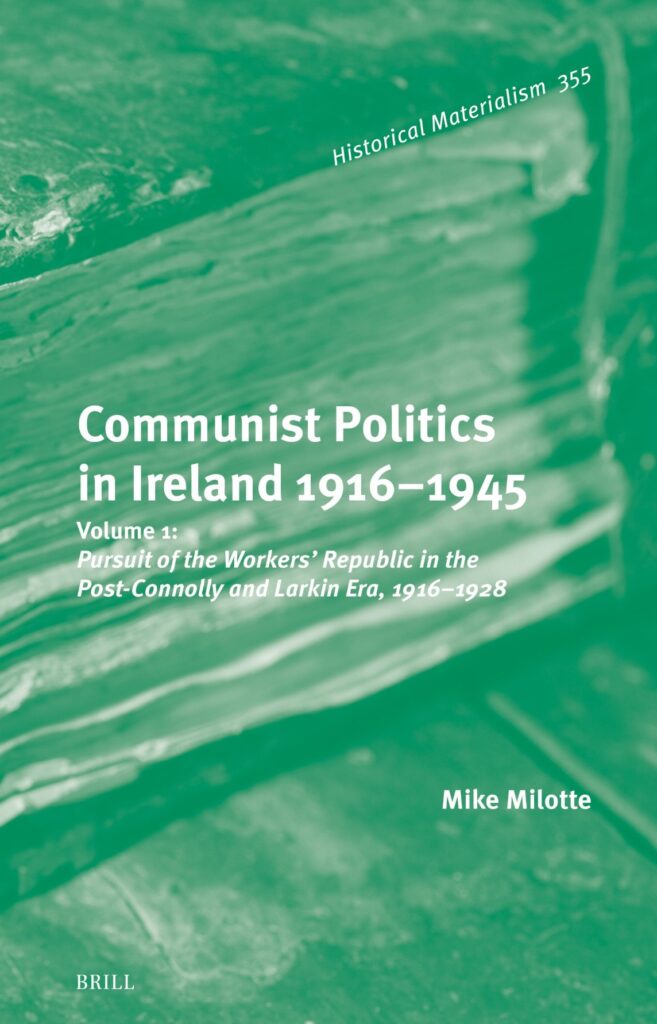Mike Milotte
During the revolutionary era, Roddy Connolly’s Communist Party robbed banks to fund its activities, and 20-year-old Connolly engaged in gun-running for the IRA while struggling to maintain control of his fractious party. In a later period of retreat, James Larkin refused to submit to the ‘imperialistic’ British Communist Party or follow the dictates of Moscow’s Stalinist bureaucracy, resisting its policies and practices on instinct.
Biographical Note
Mike Milotte earned his PhD on the Irish communist movement in 1977 and published the first full-length scholarly study of the subject in 1984. He later transitioned from academia to media, where he gained recognition as an investigative journalist, author, and broadcaster, winning numerous awards for his work.
Readership
This book is especially relevant to anyone interested in 20th-century Irish history, particularly students, teachers, and researchers in the fields of labor history, communist history, anti-colonial struggles, Marxist perspectives on the national question, and Comintern-periphery relations.
Table of Contents
Acknowledgements
Abbreviations
Introduction
Part 1 The Heritage of James Connolly
1 The Easter Rising and its Aftermath
1 Setting the scene
2 The Easter Rising
3 Filling the vacuum
4 Fighting conscription
5 Bureaucratisation and the decline of official militancy
6 Sinn Féin’s triumph
2 The Working Class in Ireland’s War of Independence
1 ‘A ghostly army of sharpshooters’ versus mass action
2 The Revolutionary Socialist Party of Ireland
3 International rivalries
4 Class struggle and national struggle
5 The struggle for the land
6 Factory seizures and workers’ soviets
Part 2 Ireland’s First Communist Party
3 What Sort of Republic?
1 Ireland’s young Bolsheviks
2 An open or clandestine organisation?
3 Conceptualising the national question
4 The second Comintern congress
5 Loyalism and socialism: the problem in Belfast
6 Unheeded pleas
4 From the Second Comintern Congress to the Formation of the CPI
1 ‘Virulent Bourgeois Terror’
2 Vying for Moscow’s ear
3 The tide turns
4 Roddy Connolly and the third Comintern congress: myth and reality
5 Connolly’s secret mission
6 Another failure
7 Bold initiatives or daily struggles?
8 Division, dissent, and the birth of the Irish Communist Party
5 From Truce to Civil War
1 ‘Not yet in touch with the masses’
2 Rubbish disposal: quality before quantity?
3 Purging old comrades
4 Cross-channel animosity
5 A parting of the ways
6 Communists and the Treaty
7 Class struggle continues as the unemployed take to the stage
8 ‘20,000 members in the next six months’
9 The road to civil war
10 Revolutionary guns and ‘reformist’ soviets
6 The Communist Party in the Civil War
1 ‘Prepared to fight as well as talk’
2 The Borodin-Connolly programme
3 Connolly’s ‘big proposition’
4 Liam Mellows and the communist programme
5 Repression intensifies
6 Connolly’s apologia
7 Turn to the Class
1 The fourth Comintern congress and its aftermath
2 Connolly’s solo run
3 The CPI’s first annual conference, January 1923
4 McLoughlin’s bid for peace
5 The CPI’s second conference
6 Connolly resigns
7 Another round of struggle
8 The CPI’s third conference
9 The prisoner issue, again
8 Larkin’s Return and the Demise of the CPI
1 Wasps and aliens
2 A losing battle
3 What is to be done?
4 Breaking resistance
5 Last throw of the dice
Part 3 Communist Politics in the Larkin Era 1924–28
9 The Irish Worker League 1923–24
1 Desperate times
2 The labour movement splits
3 CPGB hostility ramps up
4 Larkin at the fifth Comintern congress
5 Larkin at the third RILU congress
6 Larkin’s return: triumph and treachery
7 Bolshevising Larkin
8 Agreement in Moscow
10 The Failure of ‘Bolshevisation’
1 Old wine in new bottles?
2 Winning friends and influencing people
3 Party time?
4 The ‘Lansbury affair’ and its aftermath
5 Bust-up in Battersea
6 Larkin’s man in Moscow
7 To break or not to break?
11 The Workers’ Party of Ireland 1926–27
1 A missed opportunity?
2 Fianna Fáil and the Irish left
3 The WPI and the Comintern
4 Larkin at the seventh plenum of the ECCI
5 Defying Moscow
12 Larkin’s Pyrrhic Victory
1 Resisting repression
2 For Fianna Fáil, against Labour
3 Building a Larkin bypass
4 United front – with whom?
5 Unlucky Leckie
13 Larkin Breaks with Moscow, Summer 1928
1 Larkin at the ninth plenum of the ECCI
2 Back to the hustings
3 Carney at the fourth RILU congress
4 Yet more grievances
5 The final straw
6 The sixth Comintern congress
7 ‘I would rather be a Trotskyite …’
8 Post Mortem on Larkin
Conclusions
Bibliography
Index

